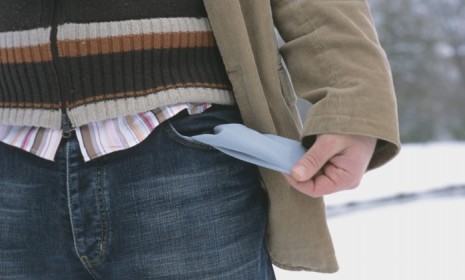Why we feel poorer 'post-recession'
By some measures, the U.S. economy is as strong as it was before the Great Recession, says Michael Kinsley in Politico. Yet somehow the average American still feels the pinch

A free daily email with the biggest news stories of the day – and the best features from TheWeek.com
You are now subscribed
Your newsletter sign-up was successful
On paper, the economy is back to where it was before the Great Recession, says Michael Kinsley in Politico. Our seasonally adjusted gross national product in the third quarter of 2010 was $13.277 trillion. Adjusting for inflation and using 2005 dollars, it was $13.268 trillion during the same period in 2007 — before the bank bailouts, and before the stimulus package. Life wasn't "so terrible for most people" back in 2007, was it? "So why are so many people glum now? Why are so many actually suffering, losing their houses or their jobs?" GDP isn't a "perfect reflection" of the average American's prosperity, but "it's not a bad one." So "why does $13 trillion feel poor today, although as recently as 2007, it felt rich?" Here, an excerpt:
There are all sorts of reasons. Among them, the relation between making or having money and feeling prosperous is far from linear. ... In judging our own prosperity, we don't compare it with long ago — or even 20 years ago. We compare it with how other people are doing and how we ourselves have been doing recently. It's no comfort to be told that you're a thousand times richer than a caveman. If a caveman killed a wildebeest, he felt rich and actually was rich by the standards of his time.
A more important reason that $13 trillion doesn't feel as rich this time as the last time we passed through it is the increasing inequality of wealth and income. In 1984, a family income of $81,365 (2009 dollars this time) put you in the top fifth of all American families. In 2009, it took 23 percent more, an even $100,000.
The Week
Escape your echo chamber. Get the facts behind the news, plus analysis from multiple perspectives.

Sign up for The Week's Free Newsletters
From our morning news briefing to a weekly Good News Newsletter, get the best of The Week delivered directly to your inbox.
From our morning news briefing to a weekly Good News Newsletter, get the best of The Week delivered directly to your inbox.
Read the full article in Politico.
A free daily email with the biggest news stories of the day – and the best features from TheWeek.com